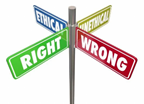1.1. Definition of code of conduct
Definition of code of conduct
The term “code of conduct” does not have an authorised definition but most emphasise that a code of conduct is a formal statement of the values and practices of an organisation. A comprehensive definition of “code of conduct” is proposed in a guidance document by the International Federation of Accountants (Professional Accountants in Business Committee) [1] :
“Principles, values, standards, or rules of behaviour that guide the decisions, procedures and systems of an organisation in a way that (a) contributes to the welfare of its key stakeholders, and (b) respects the rights of all constituents affected by its operations”

Many organisations use the terms code of ethics and code of conduct interchangeably but it may be helpful to make a distinction. This is briefly delineated below [2] .
|
Code of Ethics
|
Code of conduct
|
|
·
an aspirational document, stating
core ethical values, principles and ideals of the · a broad general policy statement · focused on values, helping members in understanding what is right or wrong · may contain general guidelines supporting judgement and decision-making · gives a foundation to rules of conduct · designed to guide the members of the organisation to act honestly and with integrity · violation of the code may result in termination or dismissal from the organisation
|
· a directional document containing practices and behaviours, to be followed or avoided · focused and specific · focused on rules and compliance · a set of rules to be followed, governing actions · based on the code of ethics · defines responsibility for adherence to rules and accountability for violations
|
Typically, then, an organisation’s code of ethics would set out the organisation’s values and principles whilst an organisation’s code of conduct would outline standards of behaviour and practices. In most cases organisations will combine both of these documents into one as there is a recognisable shift from rules-based to a values-based Code. It is rare to find organisations that have two separate codes. Whilst they are technically different documents, recalling important points around conduct and ethics will be easier if a single document can be referred to. Their availability to the public varies but is fairly wide-spread.
Some codes of conduct are labelled Code of Ethics, Code of Practice, Code of Values, Code of Ethics and professional conduct or Code of Behaviours. For this lesson the term ‘code of conduct’ will be used.
[1] International Good
Practice Guidance; Defining and Developing an Effective Code of Conduct for
Organizations https://www.ifac.org/system/files/publications/files/Defining-and-Developing-an-Effective-Code-of-Conduct-for-Orgs_0.pdf
[2] Adapted from: https://www.betterteam.com/code-of-ethics
andhttps://keydifferences.com/difference-between-code-of-ethics-and-code-of-conduct.html